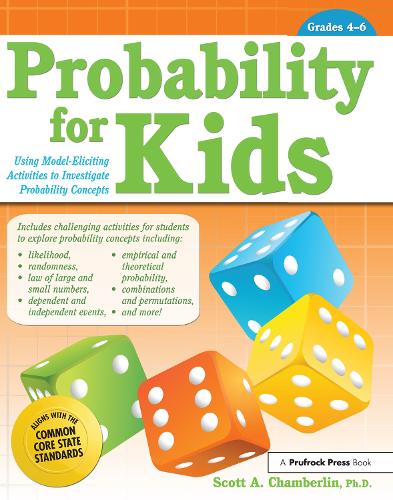
Probability for Kids: Using Model-Eliciting Activities to Investigate Probability Concepts
(Paperback)
Publishing Details
Probability for Kids: Using Model-Eliciting Activities to Investigate Probability Concepts
By (Author) Scott Chamberlin
Prufrock Press
Prufrock Press
1st February 2016
United States
Classifications
Professional and Scholarly
005.1015113
Physical Properties
Paperback
134
Width 216mm, Height 279mm
249g
Description
Probability for Kids features real-world probability scenarios for students in grades 4-6. Students will encounter problems in which they read about students their age selling magazines for a school fund raiser, concerned about their homeroom assignments, and trying to decode the combination to a safe that their grandfather abandoned, among others, all of which maximizes learning so students gain a deep understanding of concepts in probability. This book will help teachers, parents, and other educators to employ best practices in implementing challenging math activities based on standards. Problem solvers who complete all six activities in the book will understand the six basic principles of probability and be high school ready for discussions in probability.
Grades 4-6
Reviews
Probability for Kids: Using Model-Eliciting Activities to Investigate Probability Concepts is a book that engages the teacher in the learning along with her students.
Dr. Chamberlin's approach is significantly up-to-date and aimed towards teachers, especially in grades 4-6. Educators know that it is important to teach a concept in depth, through more than one method of practice, and to have students engage in creative problem solving. This book solves that problem.,Linda Biondi,MiddleWeb, 3/10/16
Probability for Kids will help teachers, parents, and other educators to employ best practices in implementing challenging math activities based on standards. Problem solvers who complete all six activities in Probability for Kids will understand the six basic principles of probability and be high school ready for discussions in probability. Thoroughly user friendly' in tone, content and presentation, Probability for Kids is an ideal and highly recommended addition to elementary school classroom curriculums and for use by home schooling parents.,Midwest Book Review, 1/1/16
This book is an exciting exemplar for mathematics investigation. The suggested instructional practiceusing model-eliciting activitiestravels beyond traditional problem-solving methodology to engage students in an exploratory process that requires creative modeling of mathematical ideas and high-level instructor questioning. This book is for teachers who seek both content and methodological inspiration. ,Barbara Allen-Lyall,Teaching Children Mathematics, 12/1/16
Author Bio
Scott Chamberlin is an associate professor in Elementary and Early Childhood Education at the University of Wyoming. His content area is mathematics education with a special interest in statistics. His research interests pertain to affect (i.e., feelings, emotions, and dispositions) and creativity during mathematical problem-solving episodes. Scott has a strong interest in mathematical modeling and feels that model-eliciting activities have particular utility with students of advanced intellectual and academic abilities. At the University of Wyoming, Scott teaches mathematics education courses to undergraduate and graduate students and prepares pre-service K-6 teachers to enter the elementary classroom. Scott earned his Ph.D. from Purdue University under the direction of Sidney Moon and his master's degree from the University of Utah under the direction of Don Kauchak.
